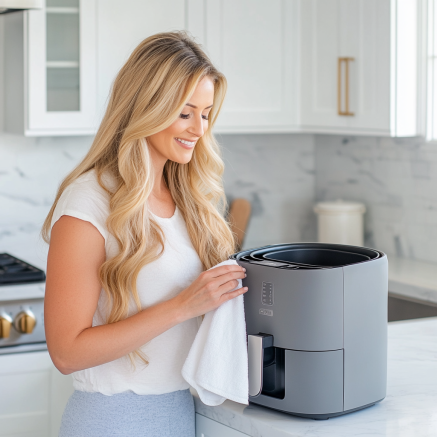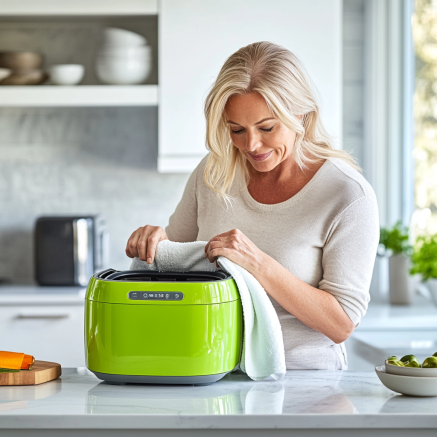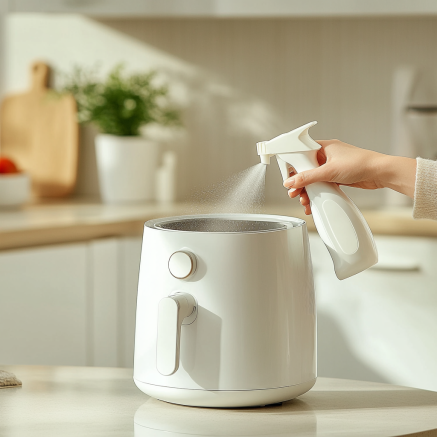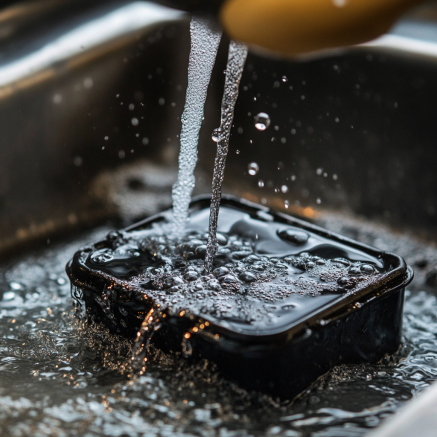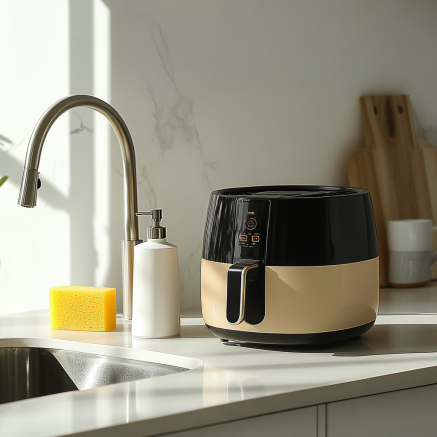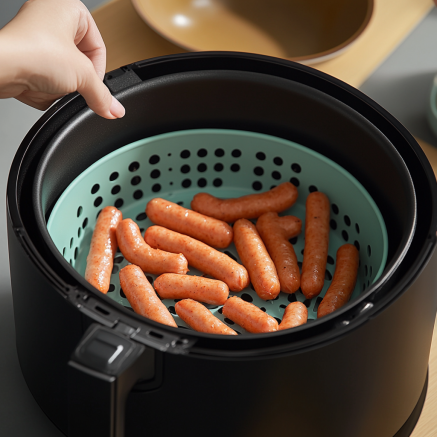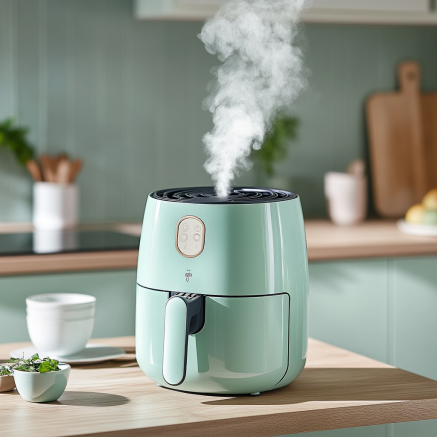How Often To Clean Your Air Fryer: A Frequency Guide
Keeping your air fryer clean is crucial for maintaining its performance and ensuring your food tastes great. This article explores how often you should clean your air fryer, the factors that influence this frequency, and provides a step-by-step guide for a thorough cleaning.
You will also find tips for regular maintenance, common cleaning mistakes to avoid, and advice on when to deep clean your appliance.
Dive in to discover how to keep your air fryer in top shape!
Why Regular Cleaning is Important?
Regular cleaning of an air fryer is essential to ensure hygienic cooking, prolong the appliance’s lifespan, and maintain its cooking efficiency. Neglecting this critical maintenance can lead to grease buildup, which may harbour harmful bacteria and compromise food safety. A clean air fryer operates more effectively, providing enhanced health benefits by preventing the transfer of toxic residues from previous meals and ensuring that food is prepared in a sanitary environment.
Utilising a well-maintained device not only enhances flavour but also supports better nutrient retention in meals, thereby safeguarding overall well-being. The significance of hygiene in food preparation cannot be overstated, as it plays a crucial role in preventing foodborne illnesses.
Regular upkeep of kitchen appliances, including ensuring all components are thoroughly cleaned, contributes significantly to their durability and efficiency over time. This investment of time in routine maintenance benefits personal health and extends the useful life of culinary gadgets, enabling families to enjoy healthier meals from appliances that consistently perform at their optimal level.
How Often Should You Clean Your Air Fryer?
The frequency of cleaning an air fryer is dependent on its usage; however, establishing a consistent cleaning schedule is essential for maintaining optimal performance and hygiene.
Daily cleaning is advisable after each use to eliminate any residual food particles and grease build-up. Additionally, a comprehensive weekly maintenance routine should involve inspecting the non-stick coating and ensuring that all components of the appliance are in good working order.
Factors to Consider
When determining the appropriate frequency for cleaning your air fryer, it is important to consider several factors, including the appliance’s features, the cooking methods used, and the types of foods prepared. Familiarity with the specifications outlined in the user manual, as well as the cooking temperatures employed, can significantly influence how often cleaning is necessary to maintain optimal performance and prevent the accumulation of residue.
For example, models with non-stick surfaces may require less frequent scrubbing compared to those made of stainless steel. Additionally, if one frequently prepares oily dishes, more thorough cleaning may be required to eliminate grease that builds up over time. Cooking at higher temperatures can exacerbate the accumulation of charred food particles, making it essential to routinely inspect and clean these areas.
By diligently reviewing the user manual, users can uncover valuable insights regarding specific cleaning recommendations, thereby ensuring that the appliance remains in peak condition for all culinary pursuits.
Step-by-Step Guide to Cleaning Your Air Fryer
Maintaining the cleanliness of your air fryer is essential for its longevity and optimal performance. Adhering to a systematic cleaning guide can facilitate this process.
YETI Rambler 20 oz Stainless Steel Vacuum Insulated Tumbler w/MagSlider Lid
$35.00 (as of 21:29 GMT +00:00 - More info)Begin by assembling the necessary cleaning tools, including a microfibre cloth, washing-up liquid, and a scrubbing brush. The cleaning procedure generally entails disassembling the appliance, thoroughly cleaning both the interior and exterior surfaces, and ensuring that all components are free from oil residue and food particles.
Materials Needed
To effectively clean an air fryer, it is essential to gather a few key materials that will facilitate a thorough and safe cleaning process. A microfibre cloth is recommended for surface cleaning, while a scrubbing brush can be employed to address any stubborn food particles. Washing-up liquid is effective for grease removal, and the use of eco-friendly or non-toxic cleaners is advisable to enhance kitchen hygiene.
Additionally, a soft sponge can be beneficial for wiping down sensitive surfaces without causing scratches, and bicarbonate of soda serves as a gentle abrasive for tough stains and odours. Vinegar, recognised for its natural disinfecting properties, is also an excellent choice as it effectively cuts through grease and grime.
By opting for these eco-friendly alternatives, one not only promotes a healthier kitchen environment but also contributes to reducing the chemical load within the home. Making conscious choices in cleaning practices enables the maintenance of cleanliness and sustainability, ensuring that the air fryer remains in optimal condition for preparing delicious meals.
Cleaning Process
The cleaning process for an air fryer necessitates specific techniques aimed at effectively addressing both the interior and exterior surfaces. It is essential to begin by unplugging the appliance and disassembling removable parts for individual cleaning, ensuring thorough removal of grease and elimination of odours.
One should start with the basket and tray, as these components typically accumulate the most residue. Soaking them in warm, soapy water can facilitate the loosening of stubborn residues. For particularly tough grease, employing a non-abrasive sponge in conjunction with bicarbonate of soda is advisable, as bicarbonate of soda also functions as a natural deodoriser.
The heating element should be wiped down gently with a damp cloth, taking care not to damage any components. Subsequently, the exterior may be cleaned with a soft microfibre cloth to prevent scratches, ensuring that the appliance retains its pristine appearance.
Regular maintenance is crucial not only for optimal functionality of the air fryer but also for preventing lingering odours that could negatively impact the flavour of your meals.
Tips for Maintaining a Clean Air Fryer
Implementing preventative measures is essential for maintaining a clean air fryer and ensuring its cooking efficiency over time.
By adopting effective cleaning strategies and user recommendations, one can minimise the accumulation of oil residue and food particles, thereby making routine cleaning efforts more efficient and less time-consuming.
Preventative Measures
Implementing effective preventative measures can significantly decrease the necessity for deep cleaning your air fryer while enhancing overall kitchen hygiene. Simple practices, such as using baking parchment during cooking, can prevent food particles from adhering to the appliance’s surfaces, facilitating maintenance and extending the appliance’s lifespan.
Regular inspections and cleaning of the air fryer’s heating element are essential for ensuring efficient operation while minimising the production of unwanted smoke and odours. It is also important to avoid overcrowding the basket, as this promotes proper air circulation, improving cooking outcomes and reducing mess.
After each use, it is advisable to wipe down both the exterior and interior with a damp cloth to promptly address any splatters. By incorporating these small, daily habits, one can transform the air fryer into a low-maintenance kitchen companion, fostering a cleaner cooking environment and enhancing the overall meal preparation experience.
Common Mistakes to Avoid
Avoiding common mistakes during the cleaning of an air fryer is crucial for both its longevity and effective maintenance. Numerous users often succumb to cleaning myths, such as using abrasive cleaners that can damage the non-stick coating or failing to adhere to the guidelines outlined in the user manual for proper care.
Cleaning Do’s and Don’ts
Understanding the essential cleaning do’s and don’ts is critical for maintaining the performance and safety of your air fryer. It is important to utilise non-toxic cleaners when sanitising the appliance; however, one should refrain from using harsh chemicals or abrasive materials that could damage the safe materials and non-stick coating.
Proper maintenance not only extends the lifespan of the air fryer but also ensures that it continues to cook food evenly and deliciously. When undertaking the cleaning process, it is advisable to allow the appliance to cool completely to prevent burns and facilitate handling. Employing a soft cloth or sponge can assist in reaching difficult spots without scratching delicate surfaces.
Always remove the basket and tray for thorough cleaning, while avoiding submerging the entire unit in water to prevent electrical damage. Adhering to these guidelines will help maintain the air fryer in optimal condition, ensuring safe and enjoyable cooking experiences.
Deep Cleaning Your Air Fryer
Thoroughly cleaning your air fryer is crucial for ensuring optimal functionality and hygiene, particularly with frequent use of the appliance.
THERMOS FUNTAINER Water Bottle with Straw - 12 Ounce - Kids Stainless Steel Vacuum Insulated Water Bottle with Lid, Pokémon
$12.91 (as of 21:29 GMT +00:00 - More info)Amazon Basics Digital Kitchen Scale with LCD Display, Batteries Included, Weighs up to 11 pounds, Black and Stainless Steel
$10.49 (as of 21:29 GMT +00:00 - More info)This comprehensive process generally entails disassembling key components, inspecting and replacing filters as needed, and utilising effective cleaning solutions to remove stubborn grease and food residue.
When and How to Deep Clean
Understanding the appropriate timing and methods for deep cleaning your air fryer can greatly enhance its performance and extend its lifespan. It is advisable to conduct a deep clean of the appliance at least once a month; however, consulting the cleaning frequency chart in your user manual can offer specific recommendations tailored to the features of your model.
This essential maintenance task not only ensures that the appliance operates at peak efficiency but also improves the taste and quality of your meals.
To begin the cleaning process, disassemble the air fryer by carefully removing the basket and tray to access all areas. Soak these components in warm, soapy water to loosen any stubborn residue, and then scrub them with a non-abrasive sponge.
For the interior of the appliance, use a damp cloth along with a mild cleaning solution, taking care to avoid any electrical components. It is important to refer to the user manual for tailored guidance on which cleaning agents are safe for your specific model.
